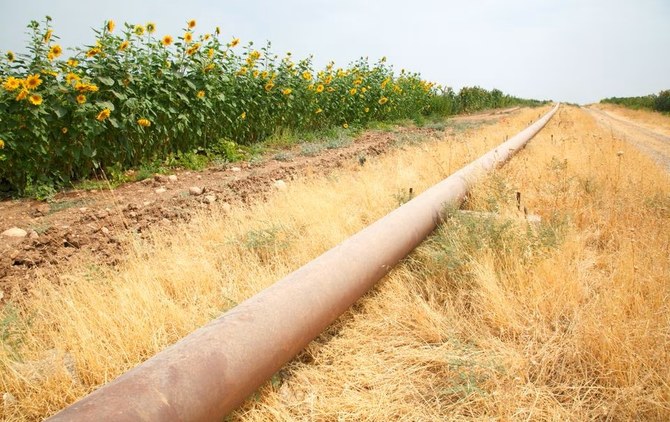
- ARAB NEWS
- 14 Jul 2025

ANKARA: Turkiye is being urged to thrash out a new oil deal with Iraq after a landmark arbitration ruling ordered Ankara to pay $1.4 billion to Baghdad for violating contracts by buying directly from the Kurdistan Regional Government.
Officials from Iraq’s Oil Ministry are expected to travel to Turkiye to negotiate a new method for exporting northern Iraq’s oil after the International Court of Arbitration’s ruling last week in a case stretching back almost a decade.
The ruling has stopped Iraqi Kurdistan’s 450,000 bpd exports, and raised fears of instability and economic crisis in the semi-autonomous region. Exports must now have the consent of Baghdad and both sides in Iraq must strike a larger agreement before oil production can fully resume.
Iraq sued Turkiye in 2014 over direct sales from the KRG and asked for $33 billion in compensation. It has maintained that the KRG cannot use national pipelines to sell oil and that Turkey’s deal with the region violated a 1973 pipeline-transit agreement between the two countries.
Bilgay Duman, coordinator of Iraq studies at the Ankara-based think-tank ORSAM, said that the case reflected the longstanding disagreement between Baghdad and the Kurdish regional administration.
“Turkiye, which will respect the international arbitration ruling, showed its readiness to fulfill its obligations deriving from the international law and to contribute to the de-escalation of the disagreement between its two regional partners,” he told Arab News.
He said that Turkiye’s deal with the KRG from 2013 had an indemnity clause that required any compensation to be paid by Irbil. However, he added: “To what extent the compensation that Ankara will pay to Iraq will be indemnified by the Kurdistan Regional Government is still unknown.”
According to Duman, the disagreement also arose from legal loopholes in Iraq about the control of newly discovered oil fields that were being exploited by the KRG.
Experts say that the ruling will hurt the KRG economy, which made $5.7 billion from oil last year.
“Baghdad appears to be ready to accept financial losses to gain sovereignty over oil,” said Yerevan Saeed, a research associate at the Arab Gulf Institute in Washington. “This has real-life consequences for Kurds in the Kurdistan region. The Kurdistan economy is heavily dependent on oil.”
He said the suspension of oil sales raised both financial and security issues for the KRG.
“The best way forward is for Ankara to play a constructive role by mediating between Irbil and Baghdad,” he said.
“If Turkiye and Baghdad are going to try to bypass the KRG to reach a state-to-state agreement, this could lead to a resurgence of Kurdish nationalism that will stir instability in the region,” he added.
Turkiye meanwhile would need to look to oil from Russia and Iran to fill the hole left by the loss of KRG oil.
Rich Outzen, a senior fellow at the Atlantic Council, said the effects of the arbitration ruling would be felt most keenly in the KRG but also Iraq. “It will hurt Iraq too as long as oil is not flowing. Turkiye and Iraq will work a deal that will involve less than the full penalty in my view,” he told Arab News.
Outzen said that the US, which provides budget support to Baghdad, should press for a quick deal with Ankara and resumption of trade. “Oil costs are affected as world oil prices increase. The latest ruling affects the Iraqi Turkish Pipeline, not trucks, so some may still move by truck,” he said.
Iraqi Prime Minister Mohammed Shia Al-Sudani recently paid an official visit to Turkiye, where he discussed a project to build a land and rail corridor from Basra to the Turkish border.